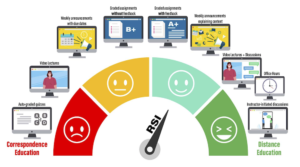
OSCQR – Standard #38
Regular and substantive instructor-to-student expectations, and predictable/scheduled interactions and feedback, are present, appropriate for the course length and structure, and are easy to find.
Review These Explanations
By setting learner expectations upfront, instructors avoid having a lot of questions asked in course Ask a Question discussion areas, or via email, thus improving course management efficiency, and reducing time spent on extra tasks. Learners will also experience less frustration if they know what to expect.
Establishing expectations, including instructor/learner and learner/learner interaction is important for keeping learners on track and for prioritizing responsibilities to help manage instructor and learner workload (Ladyshwesky, 2013).
Detailed interaction guidelines should be posted in the Course Information/Syllabus materials. These guidelines define course interaction protocol and set expectations on the frequency, response time, and quality of interactions expected from both instructors and learners.
References:
Ladyshewsky, R. (2013). Instructor Presence in Online Courses and Student Satisfaction. International Journal for the Scholarship of Teaching & Learning, 7(1), 1-23.
Regular and Substantive Interaction (RSI)
How This Standard Supports RSI
 This standard is the letter of RSI. In well-designed online courses, expectations and strategies for regular and substantive instructor-student interactions are described in the syllabus, present in the course design, appropriate for the course length and structure, and are easy to find. For example, the course will provide information on expectations for:
This standard is the letter of RSI. In well-designed online courses, expectations and strategies for regular and substantive instructor-student interactions are described in the syllabus, present in the course design, appropriate for the course length and structure, and are easy to find. For example, the course will provide information on expectations for:
- Timely and individualized feedback on learner work.
- Instructor-facilitated online discussions, or chat.
- Regularly scheduled review/help sessions, tutorials, or office hours; mid-course, or end of course student feedback surveys/polls.
- Individualized emails or other instructor-initiated individual or group communications.
- Weekly announcements (impromptu, or scheduled/automated) covering aspects of the course, or providing guidance, encouragement, feedback, etc.
Online courses can support RSI by including communication plans for regular, predictable, and substantive instructor-to-learner interaction, and clearly stated expectations for timely and regular feedback from the instructor. Directing learners to ask questions and interact with the instructor about course content, expectations, seeking help, and feedback, such as in an online discussion forum, further supports RSI, and is a good general practice. Scheduling a specific instructor-facilitated discussion on course topics, or to provide or to provide clarification, help, or feedback demonstrates compliance with RSI.
Refresh Your Course with These Ideas
General Suggestions/Resources
- Create a “What You Can Expect from Me” video and include it in the course Welcome and Getting Started activities. Let learners know early in the course what they can expect from you, and what you expect from them.
- Let learners know if you will be traveling, or unavailable at any time during the term.
- Let learners know exactly how long it will take for you to grade, or to provide feedback on their work, including work that has been submitted late.
- Notify learners if there will be any delay in feedback, including assignments and grades.
- Acknowledge any delayed feedback you give. You would want the same from your learners!
- Create an early assignment in the course to give learners the opportunity to practice using the course communication tools, trouble shoot problems, and create a reliable communication loop.
- Ask students to respond in an assignment to confirm that learners have seen feedback, announcement, or instruction.
- See SUNY Online RSI Resources.
- Synchronous Interaction.
- Asynchronous Interaction & Content Presentation.
Teaching Presence & Interaction
- Use Weekly Announcements/Email/Messages (impromptu, or scheduled/automated) to summarize assignments/interactions, explain assignments, and provide reminders/encouragements.
- Send periodic class and individual check-in communications via email or course messages.
- Send a midterm encouragement of some kind via email, video, or announcement, for the class and/or individual.
- Provide an initial communications plan with contact information and preferred methods for course communications,
- Provide details regarding how, when, and where instructors will provide extra help, answer questions, respond to emails, and provide feedback on assignments.
- Provide details regarding Virtual Office hours (schedule, calendar, how to book a time).
- Document and communicate expectations regarding instructor response time, for communications, feedback, return assignments/assessments, questions, grades.
- Provide feedback, class / individual, video, email, audio.
- Design and engage in instructor-facilitated discussions and interactions on course concepts, content, activities, assignments, etc.
- Design and guide interactions and collaborations between learners.
Built in to the Course Template/Design
- Provide a Course Calendar/Schedule – that lists e.g., synchronous or asynchronous office hours, extra help sessions.
- Provide Expectations for contact, feedback, and interaction are clear and findable.
- Create an Ask the Professor discussion forum, associated with course modules, topics, activities.
- Create an Ask a Question discussion forum, associated with course modules, topics, activities.
- Produce/provide videos/audio content presentations/lectures with facilitated online discussion for interaction on course concepts with the instructor.
- Develop and facilitate substantive online course content discussions: demonstrated by percentage of the grade.
- Design and facilitate course activities, assignments, and assessments with instructor interaction, feedback, summaries/discussion. and or videos/audio.
- Collect learner feedback for improvements in design/interaction in course for improvements, (not course evaluation).
Explore Related Resources
Share What You Know
OSCQR has been developed by a community of online practitioners interested in quality course design. There are numerous opportunities for community members to offer suggestions, donate resources, and help with future development.
Discuss this standard in the comments section at the bottom of this page.
Contribute your own ideas or refresh resources by filling out the OSCQR Examples Contribution Form.
I have used the idea of asking if the students have questions on discussion forum assignments after class zoom meetings. The questions, comments, or ideas that come up based on what we discussed during a meeting. Students ask each other and I read and respond along with students.